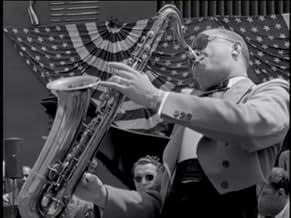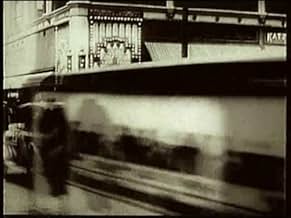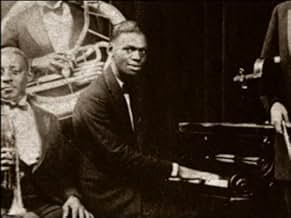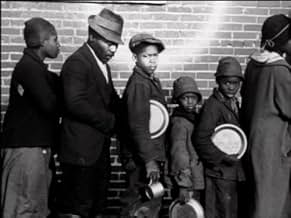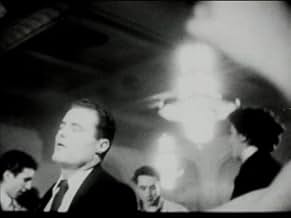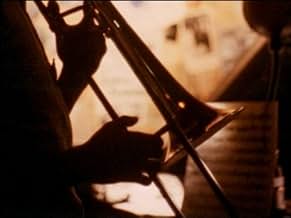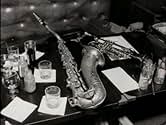Jazz: A Film by Ken Burns
- Mini-série télévisée
- 2001
- 1h 48min
NOTE IMDb
8,6/10
2,6 k
MA NOTE
Ajouter une intrigue dans votre langueA survey of the musical form's history and major talents.A survey of the musical form's history and major talents.A survey of the musical form's history and major talents.
- Nommé pour 5 Primetime Emmys
- 2 victoires et 7 nominations au total
Parcourir les épisodes
Avis à la une
Don't bother with the U.K. version (12 hours) buy the USA version (19.5 hours) it contains more and can usually be found at lower cost.
Covers the birth of jazz, swing era, move to bebop, free modal very well, but there is only scant coverage of more modern moves in the field of jazz.
Mr Burns has argued that he is more of an historian than a critic and as such he can only really deal with the phases of jazz that are from the past. This line of reasoning is, I think, not un-reasonable.
A nice touch on the DVDs is that when a piece of music is playing then pressing the "info" button on the DVD or its handset, brings up a screen about the music being played, e.g. title of music, who wrote it, who is playing, when was it recorded, etc.
Covers the birth of jazz, swing era, move to bebop, free modal very well, but there is only scant coverage of more modern moves in the field of jazz.
Mr Burns has argued that he is more of an historian than a critic and as such he can only really deal with the phases of jazz that are from the past. This line of reasoning is, I think, not un-reasonable.
A nice touch on the DVDs is that when a piece of music is playing then pressing the "info" button on the DVD or its handset, brings up a screen about the music being played, e.g. title of music, who wrote it, who is playing, when was it recorded, etc.
I enjoyed watching "Jazz" but as the show progressed I enjoyed it less and less. Much of it is because I simply like the older jazz and swing music and didn't enjoy the more modern free-form style of jazz. Much of it is also because the more I watched the show the more I noticed a few biases. EVERY EPISODE MENTIONED LOUIS ARMSTRONG. While he was a jazz great, it was obvious that Ken Burns REALLY adores Louis Armstrong and I wish he'd just made a show about him! He also strongly loves Duke Ellington. But he also inexplicably skips over some jazz or swing musicians who deserved mentioned--in particular Cab Calloway. He only mentions him BRIEFLY twice--and never positively or in any depth at all. The same could be said for Glenn Miller when the shows were about swing--it wasn't very complementary and was VERY brief (never even mentioning his premature death). This makes me wonder about what I watched--was it really the comprehensive history of jazz or just a particular and biased view? Still, despite this, the shows are well made, have some great music and did get me to appreciate and enjoy jazz and especially swing much more than I had. Worth seeing but I really would like to see some alternate view of the history of jazz, as it just felt like I was missing something.
The culture of the "People, all the People" has been Ken Burns' great theme. In the first two thirds of "Jazz" he eloquently presents these grand ideas. From Armstrong and Ellington to Billie Holiday and Benny Goodman we are swept along in a vibrant, multi-layered story of something special that would change the world.
But once the documentary reaches the 50's, the tale takes a radical turn. There is a lot of focus on drugs and broken lives. This may be important but these sad endings lead the film on a downward emotional spiral. (I understand why Spike Lee detests jazz musician's stories focusing on drugs.) But at least the music is good.
When the so called jazz music of the 60's and beyond is revealed, we see that the climax of this film is a betrayal of its beginning. The "People's music" has vanished. We see that "real" jazz is elitist and narrow and for the most part is a musical dead end.
We find that "real" jazz is played on acoustic instruments such as trumpets and saxophones. So, electric jazz guitarists are almost never mentioned as well as any electric keyboard players. And the only correct modern style comes straight from Be Bop. We hardly hear any Latin jazz or Fusion.
The great music promoter John Hammond once said that his most satisfying discovery was George Benson. Of course we never hear about Benson because he was popular and he plays electric guitar. No, instead the film's ending becomes an overblown promotion of Wynton Marsalis who since he acts as the film's "senior creative consultant" brings the great story down to an example of petty ego.
Overall "Jazz" has seven excellent episodes about a vital part of history and its effect on the world's music. Enjoy these and after that I would gently suggest to quit while you're ahead.
But once the documentary reaches the 50's, the tale takes a radical turn. There is a lot of focus on drugs and broken lives. This may be important but these sad endings lead the film on a downward emotional spiral. (I understand why Spike Lee detests jazz musician's stories focusing on drugs.) But at least the music is good.
When the so called jazz music of the 60's and beyond is revealed, we see that the climax of this film is a betrayal of its beginning. The "People's music" has vanished. We see that "real" jazz is elitist and narrow and for the most part is a musical dead end.
We find that "real" jazz is played on acoustic instruments such as trumpets and saxophones. So, electric jazz guitarists are almost never mentioned as well as any electric keyboard players. And the only correct modern style comes straight from Be Bop. We hardly hear any Latin jazz or Fusion.
The great music promoter John Hammond once said that his most satisfying discovery was George Benson. Of course we never hear about Benson because he was popular and he plays electric guitar. No, instead the film's ending becomes an overblown promotion of Wynton Marsalis who since he acts as the film's "senior creative consultant" brings the great story down to an example of petty ego.
Overall "Jazz" has seven excellent episodes about a vital part of history and its effect on the world's music. Enjoy these and after that I would gently suggest to quit while you're ahead.
This is a compilation that is pretty much essential for those coming to the music for the first time, and will afford a lot of pleasure to those who have been listening for some time too. Some of the film clips are breathtaking: you ask yourself 'where did he find that?' The focus is on the great figures of Armstrong, Ellington, Parker and Billie Holiday, which is appropriate since these people did more than others to shape the course of the music over the last century, but many viewers will be frustrated by the glancing attention and even omission given to some musicians. Why was it not thought necessary to show 'Lockjaw' Davis, Johnny Griffin, Tadd Dameron, Red Garland, Art Pepper, Lee Konitz, Jo Stafford and many more? Chick Corea and Keith Jarrett, where are they? It seems as though Winton Marsalis decided who the great ones were, and the worthy ones could be ignored.
I will praise the editors who took this huge mass of material and made something coherent and entertaining out of it. We must forever be in their debt. The way is now clear for some documentarist to make a series on jazz from 1960 to today.
I will praise the editors who took this huge mass of material and made something coherent and entertaining out of it. We must forever be in their debt. The way is now clear for some documentarist to make a series on jazz from 1960 to today.
It takes guts and talent to put together an idea like this and execute on it. Producer and director Ken Burns pulled off something we all wanted see in a documentary film. If it weren't for him, we may not have seen the likes of it in our life time. This near 20 hour epic takes Jazz from its roots to its modern day incarnations. I've learned quite a bit about history of jazz by watching this mini series, but I think the story told is little bit lop-sided. What Ken Burns failed (or purposely omitted) was the entire history of jazz guitarists. There's absolutely none represented in this series - zilch (!), and don't tell me that guitar wasn't an important part of jazz history. What Ken told was the story of jazz keyboard, and horn virtuosos. Not bad, but I still wanted to see some guitar in this series.
Martin Scorsese filled some gap with his "Blues" mini-series about blues guitarists, but a comprehensive history of jazz guitar history is still missing. Would some talented and daring director please take on the challenge ?
Martin Scorsese filled some gap with his "Blues" mini-series about blues guitarists, but a comprehensive history of jazz guitar history is still missing. Would some talented and daring director please take on the challenge ?
Le saviez-vous
- ConnexionsFeatured in WatchMojo: Top 10 Documentary Mini Series (2015)
Meilleurs choix
Connectez-vous pour évaluer et suivre la liste de favoris afin de recevoir des recommandations personnalisées
- How many seasons does Jazz have?Alimenté par Alexa
Détails
- Date de sortie
- Pays d’origine
- Site officiel
- Langue
- Aussi connu sous le nom de
- Jazz
- Sociétés de production
- Voir plus de crédits d'entreprise sur IMDbPro
- Durée1 heure 48 minutes
- Couleur
- Mixage
- Rapport de forme
- 1.33 : 1
Contribuer à cette page
Suggérer une modification ou ajouter du contenu manquant

Lacune principale
By what name was Jazz: A Film by Ken Burns (2001) officially released in Canada in English?
Répondre

